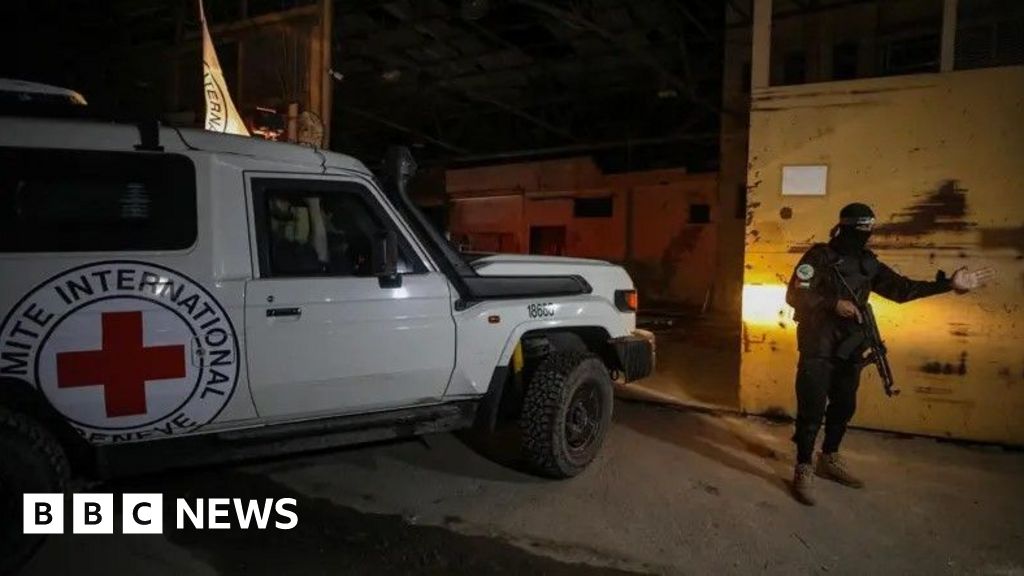Hamas said Wednesday it has handed over all the Israeli hostage remains in Gaza that it has been able to recover, and that extensive efforts and special equipment are required to find the remaining bodies.
The Red Cross said it received two more coffins containing the remains of deceased hostages, which are being transferred to Israeli authorities, the Israel Defense Forces and Israeli Security Agency said in a joint statement. The IDF said late Wednesday night local time that the coffins had entered Israel and were being taken to the National Centre for Forensic Medicine for identification.
"Hamas is required to uphold the agreement and take the necessary steps to return all the hostages," the IDF said in a statement.
The return of the hostages is a cornerstone of the Gaza peace plan, which called for Hamas to hand over all remaining hostages — 20 living and 28 dead — by Monday, Oct. 13.
Since the plan took effect last week, Hamas has been accused of delaying handing over the remains of Israeli hostages still believed to be in the Palestinian territory.
While Hamas returned the 20 living hostages by the Monday deadline, the remains of only four deceased Israeli captives were handed over. Hamas transferred an additional four bodies on Tuesday, but the IDF said one of them was not a hostage. That means the remains of at least 19 hostages are still unaccounted for.
A senior U.S. adviser told reporters on a call Wednesday that "nobody is getting left behind," noting they believe there are still many bodies buried under the mountains of rubble across Gaza. Senior U.S. advisers said the level of destruction also makes it difficult to move around in the Palestinian territory.
"It would have been almost impossible for Hamas to mobilize, even if they knew where all the 28 bodies were, to mobilize and get them home," one adviser said.
Strikingly, the adviser said that the U.S. is sharing Israeli intelligence with Hamas to assist in finding hostage remains. The adviser also said Turkey has offered to help search for and retrieve remains by sending in expert teams with experience rescuing people from the frequent earthquakes in the country.
Israeli Defense Minister Israel Katz said in a social media post on Monday that Hamas' initial return of only four bodies constituted "a violation of the agreement" and added that "any delay or deliberate avoidance will be considered a gross violation of the agreement and will be responded to accordingly."
During negotiations that led to the deal, Hamas representatives said they did not know the location of all the remains of deceased hostages, according to Israeli media reports. President Trump also said in Egypt on Monday that not all of the bodies of the deceased hostages had been found, adding that unidentified parties were still "working out" how to locate an unspecified number of remains.
Both the Israeli Hostages and Missing Families Forum, the group that represents the hostage families, and Israel's defense minister have said the entire peace deal should be shelved until all of the hostages' remains are returned by Hamas.
Senior U.S. advisers who spoke to reporters on Wednesday, citing the difficulties in retrieving the remains still in Gaza, urged patience and said they are not at a point where they feel that the agreement has been violated.
Even if these issues are resolved, the 20-point peace plan still faces other considerable hurdles. Hamas wants the Israeli military–which still occupies more than half of Gaza–to withdraw entirely. But Israeli Prime Minister Benjamin Netanyahu told "CBS Mornings" co-host Tony Dokoupil on Tuesday that the conditions of the plan "are very clear — it's not only that we get the hostages out without getting our military out, but that we would subsequently have both demilitarization and disarmament. They're not the same thing. First, Hamas has to give up its arms. And second, you want to make sure that there are no weapons factories inside Gaza. There's no smuggling of weapons into Gaza."
But Hamas has rejected calls to disarm, and, since the start of the ceasefire, CBS News' team in Gaza has seen Hamas back on the streets, still armed, and reportedly confronting rival groups. Mr. Trump on Tuesday warned that if Hamas does not disarm, "we will disarm them," adding: "It'll happen quickly and perhaps violently. But they will disarm."
Netanyahu said he heard Mr. Trump's remarks, paraphrasing them as "all hell breaks loose."
"Well, I hope it doesn't," Netanyahu told Dokoupil. "I hope we can do this peacefully. We're certainly ready to do so."
Olivia Rinaldi contributed to this report.











 English (US) ·
English (US) ·